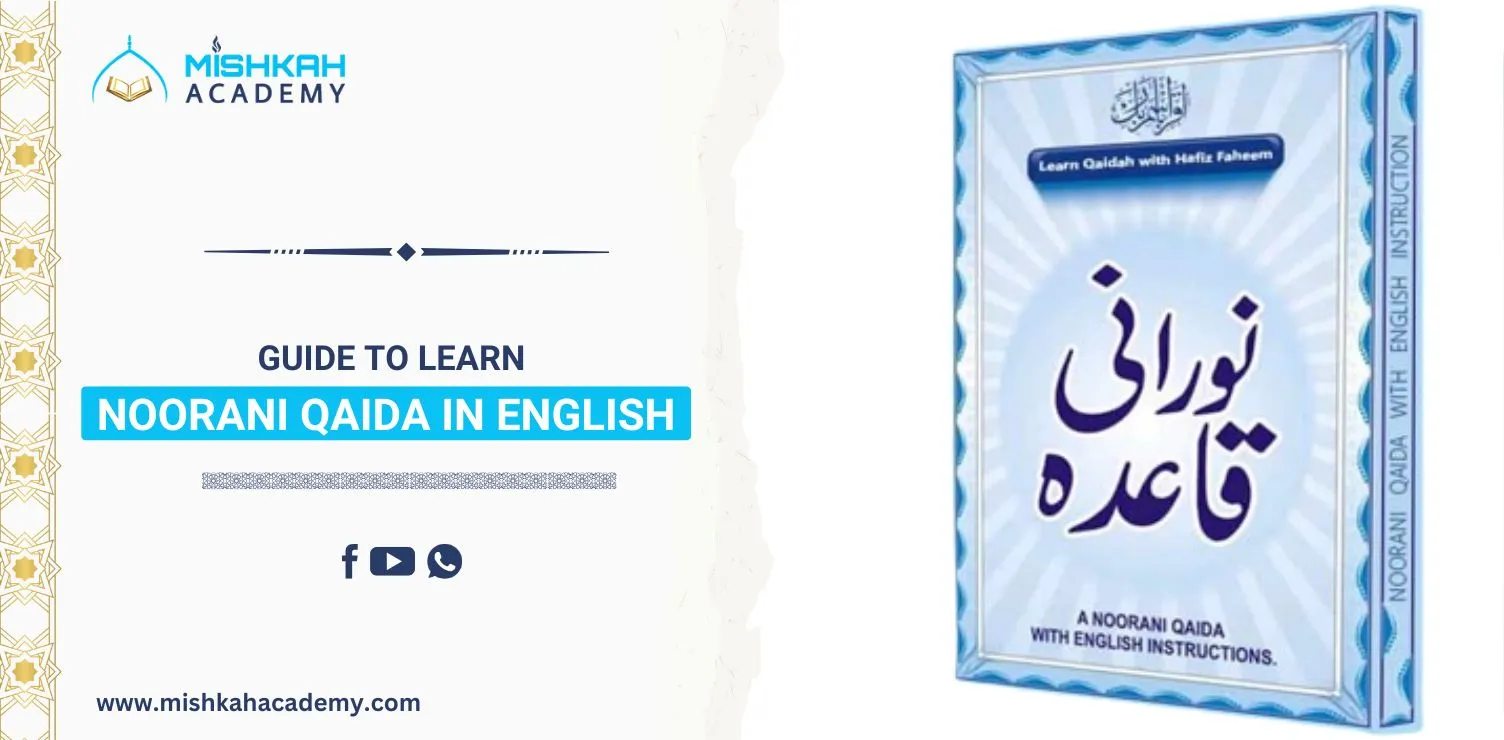Many non-Arab Muslims want to learn Noorani Qaida but face challenges because Arabic is not their first language. Thankfully, learning Noorani Qaida in English is entirely possible with the right approach. This article provides clear and practical tips designed for English-speaking learners.
Some of these tips include using Noorani Qaida with English translations, starting with Arabic letter basics, and following online English courses. You can also practice phonetics through English notes and guided audio lessons. English-speaking quran tutors, apps and online quran learning platforms simplify the process further. With these steps, anyone can begin their Noorani Qaida journey effectively.
10 Tips to Effectively Learn Noorani Qaida in English
Table of Contents
ToggleHere are some tips by Mishkah Academy Quran teachers for English speakers of the USA, UK, Canadian, Australian, and European Muslims to learn noorani qaida in English.
1. Use Noorani Qaida with English Translations
Start with Noorani Qaida books that include English translations for every Arabic letter and word. These books explain the pronunciation and provide simple instructions in English. For example, when learning the letter “ب” (Ba), look for notes like “B as in Boy.” This helps you link Arabic sounds with familiar English words.
Many such resources are available online or in local Islamic bookstores. Ensure the book is easy to follow and designed for beginners. Using translations allows you to understand Arabic pronunciation without confusion, especially when learning new words or rules.
2. Start with Basic Arabic Letter Recognition
Begin with identifying Arabic letters and their sounds. Use a simple table like this for clarity:
| Arabic Letter | Name | English Example |
| ب | Ba | B as in Boy |
| ت | Ta | T as in Ten |
| ث | Tha | Th as in Three |
Practice reading and writing each letter daily. Focus on matching sounds with letters. Repeat these sounds aloud for better memory. Learning one letter at a time is a great way to start mastering the Noorani Qaida course.
3. Learn Phonetics through English Pronunciations
Follow these steps to understand Arabic sounds using English pronunciations:
- Start with individual Arabic letters, like “ب” (Ba), and pronounce them repeatedly.
- Link each Arabic sound with a similar English word, such as “T” in Ten for “ت” (Ta).
- Combine letters to form simple syllables, like “Ba-Ta.”
- Practice these sounds aloud until they feel natural.
Focus on clear pronunciations. Listening to Arabic sounds while repeating them is a simple but powerful technique. Phonetics becomes easier when linked to English words.
4. Follow Online Noorani Qaida English Courses
Enroll in online Noorani Qaida courses taught in English. Mishkah Academy, for example, offers structured lessons. Their tutors guide you step-by-step in English, helping you understand Arabic concepts clearly.
These courses are flexible and allow you to learn at your own pace. They provide interactive resources, including videos, audios, and quizzes. This method works well for beginners unfamiliar with Arabic. Search for platforms offering free trials to see which suits your learning needs best. Online classes save time and ensure expert guidance.
5. Practice with English-Arabic Teaching Apps
Apps make learning Noorani Qaida for beginners simple and fun. Some recommended apps are:
- Learn Quran Tajweed: Offers interactive lessons for Arabic reading.
- Quran Companion: Includes English guidance for Tajweed and Noorani Qaida.
- Noorani Qaida App: Focused solely on helping beginners master Arabic reading.
These apps offer audio and visual aids to learn at your own speed. Download them on your smartphone and practice daily, even on the go.
Tips: Enroll in “Online Quran Recitation Classes” with English-speaking native arab tutors to learn noorani qaida in English perfectly.
Start Learning Noorani Qaida in English Now6. Seek an English-Speaking Quran Tutor
Look for tutors fluent in both Arabic and English. They can explain Noorani Qaida rules in simple English. Online platforms like Preply and Italki connect you with such tutors. Personalized guidance ensures mistakes are corrected early. Tutors also adjust lessons to your learning speed. Sessions typically include live feedback on pronunciation and tips to improve.
This is ideal if you prefer one-on-one support. Search for tutors with experience teaching English-speaking students. Having someone guide you in your language makes learning easier and faster.
7. Use Noorani Qaida Books with English Notes
Some Noorani Qaida books come with English notes for beginners. Examples include:
- “Noorani Qaida: Beginner’s Guide with English Instructions”
- “Learn Noorani Qaida with English Translation.”
These books include step-by-step explanations in English and clear examples. Each rule is written in simple language for easier understanding. Notes highlight pronunciation and common mistakes to avoid. Such books are available in bookstores or online platforms like Amazon.
8. Practice Reading with Guided Audio Lessons
Listen to guided audio lessons from well-known Quran teachers. Some recommended ones are:
- Sheikh Mishary Alafasy: Focuses on beginner-friendly pronunciation.
- Qari Abdul Basit: Offers clear and slow recitation.
- Mufti Menk: Explains reading techniques in English.
Choose lessons that cover Noorani Qaida basics, such as letter sounds and blending rules. Follow along while reading your Qaida book. Repeat each sound until your pronunciation matches the recording. Guided audios help you understand the rhythm and flow of Arabic recitation and help in understanding quran reading rules.
9. Watch Noorani Qaida Tutorials in English
YouTube has many Noorani Qaida tutorials in English. Some popular channels include:
- Holy Quran Education: Offers beginner-level lessons with clear instructions.
- Islamic Learning Center: Provides step-by-step Noorani Qaida tutorials.
- TPQ Online: Features interactive videos for English speakers.
These tutorials are helpful if you prefer visual learning. They cover Arabic letter recognition, rules, and pronunciation. Replay difficult sections to practice as needed. Watching tutorials allows you to learn at your own speed and reinforce what you’ve studied.
10. Enroll in a Local English Quran Class
Find local mosques or Islamic centers offering Quran classes in English. These classes are tailored for English-speaking beginners. Benefits include:
- Face-to-face support from experienced teachers.
- Group learning encourages interaction and motivation.
- Regular feedback to improve your reading skills.
- Consistent schedules to ensure progress.
Local classes provide a structured environment for learning Noorani Qaida. They also allow you to connect with others on the same journey. Enrolling in an online quran learning platform with native Egyptian online quran teachers to learn noorani qaida in English.
Conclusion
Learning Noorani Qaida in English is possible with the right resources and methods. With tools like English-translated books, guided audio lessons, and online courses, even non-Arabic speakers can master the basics.
Among these options, Mishkah Academy stands out as a pioneer in learn quran online at home for English speakers Muslims from the United Kingdom, the United States, Australia, Canada, and Europe. They offer experienced tutors who specialize in teaching Noorani Qaida to English speakers. With years of expertise, their structured approach ensures effective learning tailored to every student.
Start Learning Noorani Qaida in English Now





